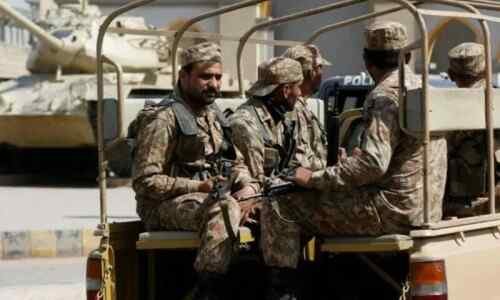In the wake of rising terror incidents in Khyber Pakhtunkhwa (KP), the government has clarified that no fresh military offensive is planned. However, State Minister for Interior Talal Chaudhry emphasized that counter-terrorism efforts under the National Action Plan (NAP) will persist, despite strong opposition from the Pakistan Tehreek-e-Insaf (PTI).
Talal Chaudhry responded directly to PTI leader and former National Assembly speaker Asad Qaiser’s warnings in Parliament, where Qaiser vowed to resist any new military campaigns in the PTI-led province. This stance aligns closely with PTI founder Imran Khan’s demand that the KP government oppose such operations, reflecting broader concerns voiced by local tribal communities who fear renewed conflict.
While denying plans for a new offensive, Chaudhry insisted that NAP-related security measures would move forward regardless. He also called on KP’s provincial authorities to step up their role in tackling militancy, pointing out that the province had received Rs700 billion through the National Finance Commission for counter-terrorism efforts but had yet to enhance the capacity of its law enforcement agencies.
Chaudhry also criticized PTI for allegedly supporting the resettlement of Taliban-linked militants, questioning their loyalty: “Are you with the militants or the state?” This comment came amid reports that a potential military operation in Bajaur was delayed following peace talks between the Bajaur Aman Jirga and the banned Tehreek-e-Taliban Pakistan (TTP).
PTI Demands Fair Trial for Imran Khan and Condemns Parliamentary Crackdown
Earlier in the day, Asad Qaiser called for an impartial and transparent trial for Imran Khan. Clarifying that the party’s demand for Khan’s release hinges on “independent trial” standards, Qaiser accused the ruling coalition of undermining constitutional norms and the rule of law.
Qaiser lamented the increasing marginalization of PTI lawmakers, describing their removal from Parliament by unidentified forces and their ongoing disqualifications connected to the May 9, 2023 violence. He condemned the National Assembly’s transformation into a “rubber stamp,” announcing plans to boycott parliamentary sessions deemed “unlawful.”
PTI member Sher Afzal Marwat also voiced concerns about political hostility, criticizing the ruling parties’ behavior toward opposition lawmakers. He called for an official investigation into what he termed an “attack on Parliament House,” referencing the September night raid in which several PTI members were detained. Marwat warned that such confrontational attitudes foster political hatred and harm Pakistan’s democratic culture.
Economic Boost as US Lowers Tariffs on Pakistani Goods
On the economic front, the government highlighted a recent trade development that could positively impact Pakistan’s exports. During Question Hour, Minister of State for Finance Bilal Azhar Kayani announced that the United States had reduced its tariff on Pakistani goods from 29% to 19%, the lowest rate among South Asian competitors.
The Commerce Ministry further detailed in a written statement that this tariff reduction saved Pakistan over $1 billion. The move is expected to enhance Pakistan’s export share in the US market, particularly in textiles, by making Pakistani products more competitive.
Commerce Minister Jam Kamal Khan described this adjustment as a “game changer” for Pakistan’s export potential, projecting increased market penetration in the face of stiff international competition.
Lifesaving Medicine Shortages Under Scrutiny
In a parliamentary session addressing healthcare concerns, Parliamentary Secretary Nelson Azeem claimed there is no current shortage of critical drugs, including insulin and cancer treatments. He acknowledged a brief shortage in May amid tensions with India but maintained supplies have since stabilized.
However, PPP’s Sharmila Farooqui challenged this optimism, pointing to ongoing intermittent shortages in both urban and rural areas. She attributed these problems partly to nearly 100 vacancies in key positions within the Drug Regulatory Authority of Pakistan, which she said compromised the agency’s ability to regulate prices and ensure availability.
Farooqui also cited Pakistan Bureau of Statistics data showing annual price increases for lifesaving drugs at 17.5%, with recent spikes of 13% and 15% in urban and rural areas respectively. These inflation trends pose a serious challenge for patients relying on these medications.

